Inspectors, data, and fines: this is how Ibiza closes in on pirate taxis and illegal Airbnbs.

The pirate waits, smoking, at La Ponderosa, a bar near the entrance to Ibiza Airport. The message popped up on his WhatsApp: "XXXX at airport." The x's are the license plate of the car in which three Transport inspectors from the Consell (Spanish Consell) have arrived at the airport. The most veteran of them stands guard like a lone ranger at the entrance roundabout in 38-degree heat, under the sparse shade of a palm tree. Armed with a whistle and a yellow vest, he stops vehicles suspected of transporting unlicensed tourists, especially high-end vans with tinted windows, identical, except for their license plates not being blue, to vehicles with drivers holding VTC licenses.
The drivers protest when stopped, especially by someone without a gun. There's not much stopping them either: the mere presence of the yellow vest prevents the pirates from getting off. Meanwhile, at Arrivals, a line of white taxis picks up the queue of passengers landing on one of the 150 flights a day (as many as depart). Nearly 1.5 million passengers passed through here in August of last year.
“There are clients for everyone,” complains Marius at La Ponderosa, who has been offering his services in the airport lobby for 19 years with another thirty illegal drivers. “But this year the president has become obsessed with making our lives miserable.” From the Ibiza Island Council, Vicent Marí (PP) responds: “Indeed, this government team is obsessed with ensuring compliance with the law. We cannot allow profiteers who see Ibiza as nothing more than a cash register and conduct their business outside the law, the rules, and peaceful coexistence.”
The patrols of officials who have been patrolling the airport for 14 hours, seven days a week, since this summer are part of the Consell's emergency plan to curb intrusion into transport and tourist accommodation. This package of measures includes the hiring of 25 people (inspectors, file examiners, and administrative staff); the implementation of technological applications to cross-reference data and understand the scale of the problem; new regulations, such as the mandatory reservation of a campsite for caravans; and hefty fines, from €15,000 for illegal transport to €500,000 for some unlicensed accommodations...
Ibiza has had an island-wide Intrusion Control Department since 2019, but this year it received €22 million (divided over four years) from the eco-tax (a tax of a couple of euros per night levied on all tourist accommodations). It also has a new director, hired in November: Enrique Gómez Bastida , formerly head of the Civil Guard on the island, whose operational strategy many attribute to the department's shift to crack down on those who break the law.
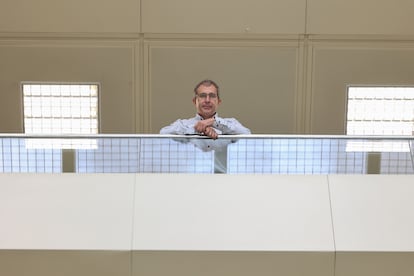
“I have the vision I have, it's my byword, and I'm also working with things that are familiar to me,” says the lieutenant colonel, downplaying his importance. He knows the airport well (from his time as head of the Benemérita), the sector (he worked at the State Secretariat for Tourism in Madrid), and the marketing platforms (due to his experience in the fight against online fraud). Even so, he argues that the successes of the shock plan come from the political commitment of the Consell and, above all, from the “consensus” of all the economic players—employers, SMEs, self-employed workers, platforms—who operate in a “very consolidated” market. “Ibiza is a monoculture,” he says, “there are no swings; the entire sector is united in its general principles.” Whatever the reason, and pending the presentation of the season's figures, Bastida highlights some successes: airport pirates have been taken down, €400,000 has been raised in fines for illegal accommodations (190 cases are open), and pioneering agreements have been reached with platforms like Airbnb to make it mandatory to include the license number on all new listings and to remove others without the need for an administrative procedure. In seven months, the number of accommodations listed has dropped from 4,450 to 2,570 (a 60% reduction in beds). "The police don't want to arrest thieves; they prefer to avoid thefts," says Bastida with a half-smile. "The priority of this first phase was to prevent commercialization with mass deactivations... Today we've removed another 300 listings," he says with a smile.
Detectives and swimming poolsTo encourage the platforms to collaborate, Intrusion Prevention decided to make it easier for them by identifying fraud. In another office at the Consell, Javier Torres, the island's director of New Technologies, displays the process on two large, curved, gaming- style monitors. One contains an open-source geographic information system, essentially an editable map, where the legal tourist accommodations (1,693 on rural land, 762 on urban land) registered by the Consell have been marked, and on another layer, all the accommodations offered by Airbnb (which don't provide their exact location).
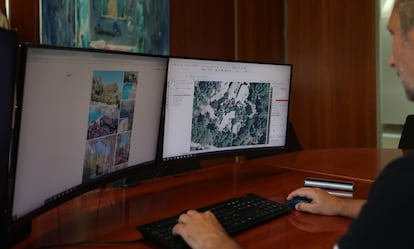
An official checked, point by point, whether each advertisement corresponded (or not) to a license, marking them in green or red. "At first, we found an illegal one every 15 minutes," says Torres, whose team updates the map with the most recent advertisements, which appear as yellow stars. They're a constellation.
It's detective work. To locate the most elusive accommodations, you have to pay attention to the details in the listing photos and look for correspondences in satellite images: the drawing of an anchor in the mosaic of a pool, the ocean side of a window, a distinctive trellis.
Sometimes the investigation goes beyond the office and suspicious accommodations are searched door to door; this can result in a fine, usually between €40,000 and €80,000. The list of offenders includes everything from poorly converted vans, rooms in houses, short-term rentals in apartments in multi-family buildings (prohibited in Ibiza) with the ubiquitous urban Airbnb decor, and even luxurious villas.
Bastida explains that intrusion brings complications in water, waste, and mobility management to a particularly fragile territory, but warns that even eradicating it completely wouldn't solve the island's housing crisis. "The mantras of touristification simplify the debate," she opines. "Campers or rooms—which accounted for 30% of Airbnbs when we started—don't take away decent housing; just as preventing illegal rentals of a luxury villa doesn't make it easier for those who can't afford it."
He does believe that anything unregulated "appeals to a certain type of customer and behavior" that those with a license won't take the risk of ("in Ibiza, it's gold; losing it can reduce the value of a property by up to 20%"). In this regard, the Consell has commissioned an app for the local police to locate on the Intrusion Map the accommodations they visit due to noise or disturbance complaints. "If the complaints are repeated, it could be another clue to finding illegal accommodation," says Torres, showing the app on a flip-screen phone.
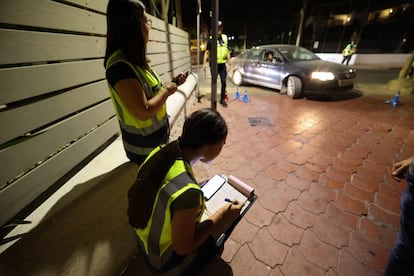
Tonight, the police in San Antoni de Portmany, a party town par excellence, are accompanying transport officers to conduct a vehicle check in the beach club area. Within just 15 minutes of placing the cones, a Telegram group with 60,000 members (the island has 160,000 inhabitants) gives the go-ahead. Before then, the inspectors were able to stop a Russian man in his 60s who was driving a twenty-something English couple in the back. They claim to be friends of his wife's nephew, but as soon as they can, they abandon the man, who watches in disbelief as the tow truck takes his Audi away. If he wants it back, he'll have to pay a €15,000 fine (last year it would have been €3,000).
Historically, the taxi was king on the island, coexisting with a fixed fleet of luxury VTCs and another of airport pirates, but the taxonomy has become more complicated, especially with the arrival of Uber in 2023. VTCs have grown from 50 to 450 (there are a thousand taxis, half of which are seasonal), and, outside the law, there are also classes. Pablo (not his real name) distinguishes between "friendly drivers "—drivers with a client base who offer privacy, for example, to get high, in the ubiquitous Mercedes Vito—and "shady pirates who harass people at the airport." The latter can rent luxury vans or drive €500 trucks that they leave in the impound lot when they pick them up. Pablo was a friendly driver until he bought a license last year for €135,000 (up to €240,000) and months of paperwork. He is delighted with the tough measures the Consell has imposed at the airport, where, thanks to a loophole found by Aena following the homeless problem at Barajas Airport last June, access can be controlled for anyone without a boarding pass.
However, beyond the airport lobby , anyone searching online or asking a nightclub bouncer, waiter, or hotel receptionist can join dozens of WhatsApp groups, with numbers of all nationalities, where private travel arrangements are made outside the rules. Clients are also still being recruited on the fly in the crowded ferry crossings, at nightclub exits, or on beaches where people gather to watch the sunset.
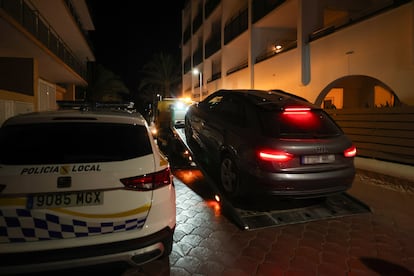
The island's director of transport, Roberto Algaba, makes no distinction between " pirate pirates" and those other illegals "who act as friends of a friend," because "they do the same damage."
“The intrusion is like a spider's web,” says Algaba, who studies criminology and explains it by using the term “black figure.” “Its effects are transversal and difficult to quantify.” Illegal taxis affect Ibiza's image as a safe destination, he says, promote the offering of drugs or prostitution, and encourage robberies (because drivers warn when an apartment is empty, he explains). Algaba refers to them as a “mafia.”
“There’s nothing mafia-related about it,” says Marius, offended. He claims he works 18 hours to make about 400 euros a day (250 goes to renting the luxury van he drives). “I make a living because VTC licenses are in the hands of speculators who sell them for a fortune.” He says he’d accept a “reasonable” monthly fee and concludes: “There’s no one below us; the Consell is cutting off the roots of the problem, when it should be targeting the head.”
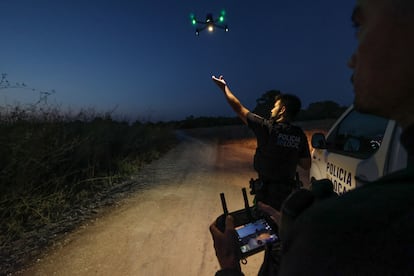
That's more or less the argument used by an Italian waiter living in a hidden caravan in Cala Comte. "You won't find mine," he tells the transport agents who, along with the San José police, have just fined a man from Seville for parking his camper on rural land without a reservation at one of the island's four campsites. "There are bigger fish to catch..." the Italian says, clicking his tongue. Meanwhile, the man they caught tries to justify that he came to watch the sunset, that he's spending the night at a friend's property, that he wasn't informed either on the ferry or at the entrance to the cove (the sign is painstakingly graffitied)... He grows increasingly angry. "What are you telling me about a €20,000 fine for parking on the beach!" Even so, he takes it.
“A caravan seems harmless, but it attracts others, and the settlements can't be normalized; we had unsustainable situations,” says Algaba. “Dozens parked in coves and beaches, garbage, problems with coexistence, sewage and gray water dumped into natural spaces…” A little further from Cala Comte, in Torre d'en Rovira, the police fly a drone searching for caravans in the undergrowth. A neighbor passes by. “Look over there, there's one,” he squeals, complaining about the filth, the risk of fires, the loose dogs, the parties… “Ibiza isn't a campsite.”
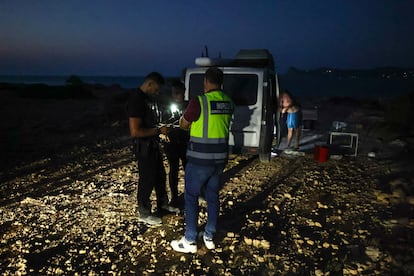
The president of the Consell explains that "the fight against intrusion is not about increasing legal demands or defending any bigwigs." Tourism and urban planning "is something to be believed," says Marí. "We can't waste more water than we have, nor consume more resources. Intrusion disrupts the balance of that planning. In Ibiza, we're not committed to growth, but to balance."
Back at the airport, the inspectors finish their shift and Marius sends a WhatsApp message saying "Free Airport." The pirates are appearing in Arrivals, and the social media accounts of legal taxi drivers are filling up with their photos. "We know them all," says Lolo Ruiz, a taxi driver who belongs to the Elite Corsaris association, which has been fighting pirates for a decade. "This year, we've finally noticed a sharp change, but although they're seen less at the airport, they're still around. The Consell (Consell) has to keep cracking down."
EL PAÍS





